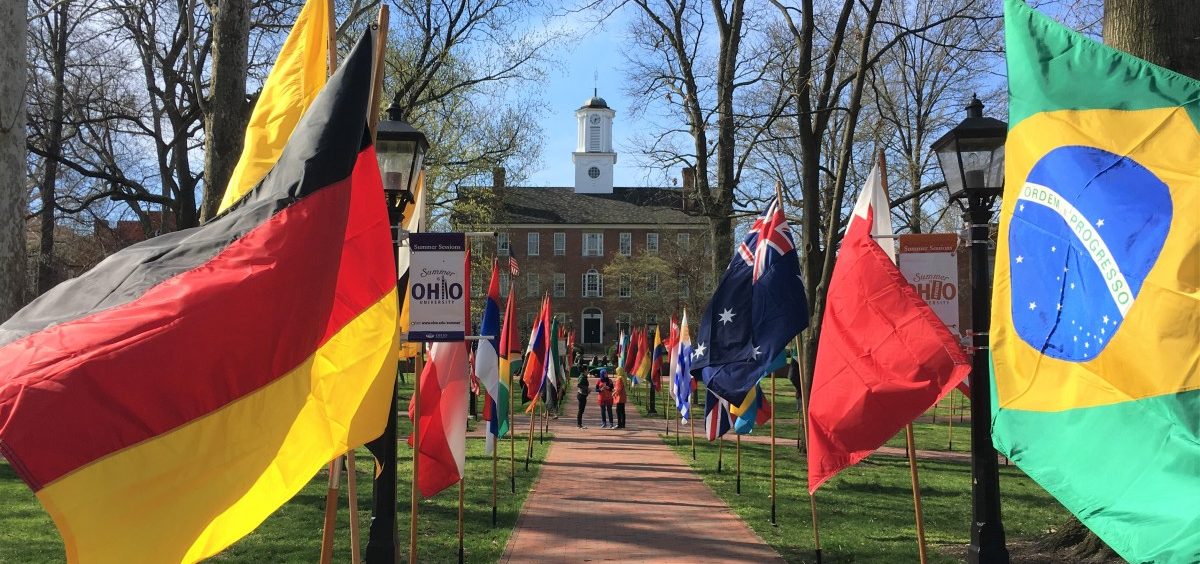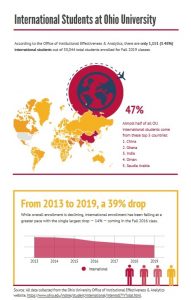
Ohio University’s International Students Look Forward to Biden Presidency
By: Kaitlin Fochesato
Posted on:
International students at Ohio University weren’t able to vote in this year’s presidential election, but that doesn’t mean they’re unaffected by the outcome.
Yana Durado, a senior studying integrated media, said her reaction to the results was positive.
“I was relieved,” she said.
Diane Cahill, the director of International Services and Operations at OU, said Durado wasn’t her only student that felt the way.
“I know that there are a lot of students who breathed a sigh of relief when the election was called in [Biden’s] favor,” Cahill said.
Four years earlier, Durado had the opposite feeling. Her decision to attend university in the U.S. from the Philippines made her uneasy leading up to President Donald Trump’s election in 2016.
“I was kind of hesitant to come here knowing what he stands for,” Durado said.
Data from OU’s Office of Institutional Effectiveness & Analytics show a declining number of international students enrolled every year since 2013. The Fall 2019 class had 1,151 international students compared to 1,881 enrolled for the start of the 2013-2014 academic year, a decline of almost 40% in six years.
Cahill said several factors have contributed to this decline. Countries around the world have fortified their higher education opportunities at home, and specific countries, like Australia, Canada and England have also become a huge draw to those still looking for an international experience in college.
But over the last few years she believes one of those factors has been the president.
“There’s an understanding, I think for students, that there are a lot of people who aren’t sure they want them to be here,” she said.
And for some students, that understanding only became real once they arrived in Athens.
“There were students who have said that they have been called names. There are students who have told me they have been on spit on. There are students who told me they have been treated in ways I think all of us as people traditionally would not treat someone,” Cahill said.
However, Cahill said the Trump Administration is not fully to blame for these students’ experiences.
“Now that doesn’t mean it didn’t happen before,” Cahill said. “I don’t want to pretend that it’s been, ‘Oh, hunky-dory,’ then everything fell apart. That’s not fair, either. But there has been more reports of incidents and reports of negative behavior towards students than we saw in the past.”
Immigration policies promoted by the Trump administration have also affected international students at OU.
In July, amidst surging coronavirus cases in Ohio and the country, the Trump administration floated a new policy that would demand international students return to their home countries if universities were to switch to online-only classes in the fall or face deportation.
In addition, international students planning to attend university in the fall would not be allowed entry into the U.S. if their chosen university did not have in-person instruction.
“We [would have] had 10 days to pack and go back to our country, which was insane, because we’re in the middle of a pandemic,” Durado said. “It was really stressful.”
Ultimately, the Trump administration dropped the proposal after fierce backlash from universities and immigration advocates. International students often pay higher tuition costs, and with several colleges and universities facing difficult financial realities amid a pandemic, losing international students may only deepen funding shortfalls.
Jennifer Nisevich, the associate director of International Student and Faculty Services, said the State Department and other agencies have adopted stricter policies, as well.
“There have been cases when clearly the government is looking for any little technicality — even a typo,” Nisevich said. “Where they can use that to deny a student a benefit that they are applying for [and that] they should get as part of their immigration status.”
She added this has made it more difficult for students to acquire visas and receive approval for certain applications.
But a new president, Cahill said, won’t erase these problems for international students.
“Those things aren’t going to go away. You’re still going to have people who have fears and have concerns and don’t trust,” Cahill said. “There’s no switch that’s going to flip, and we’re all going to nice to each other. You know, that’s not realistic.”
However, President-elect Joe Biden does have something unique that might singularly benefit international students: his wife, Dr. Jill Biden.
“She works at a community college, and she works with English-language learners,” Nisevich said. “So, she has a lot of experience working with international students, so I personally kind of anticipate that some of that would be reflected in the tone set by the presidency.”


